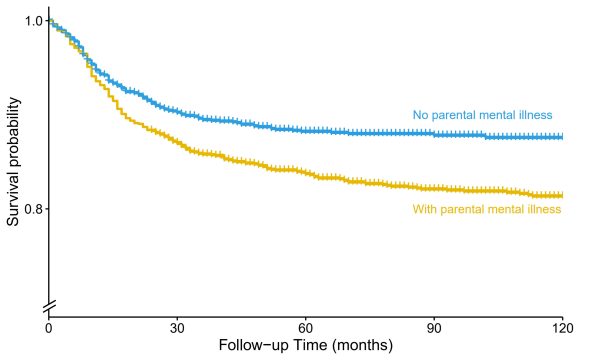News Express: UM and Lund University uncovers link between parental mental illness and higher mortality in children with cancer
新聞快訊:澳大與隆德大學:父母精神健康問題增加患癌兒童死亡率

父母精神疾病與癌症兒童死亡風險的關係
The risk of mortality among children with cancer in relation to parental mental illness
澳大與隆德大學:父母精神健康問題增加患癌兒童死亡率
由澳門大學健康科學學院教授紀建光與瑞典隆德大學教授Jan Sundquist和Kristina Sundquist共同帶領的國際研究團隊發現父母精神健康狀況與兒童癌症患者死亡率存在顯著關聯。該項基於瑞典全國臨床登記資料的大規模研究表明,父母在子女確診癌症後出現的抑鬱、焦慮等精神健康問題,會顯著增加兒童癌症患兒的死亡風險。這一突破性發現強烈呼籲醫療系統將兒童癌症患者父母的精神健康監測納入常規臨床實踐,並明確將家庭心理健康干預確立為兒童癌症綜合治療中不可或缺的關鍵環節。該研究成果已發表於腫瘤學領域權威期刊《Journal of the National Comprehensive Cancer Network》。
儘管現代醫學在兒童癌症治療領域取得顯著進展,癌症仍是全球兒童死亡的主要原因。兒童癌症不僅對患兒是重大打擊,更會對整個家庭系統造成深遠影響。既往研究表明,癌症診斷帶來的心理衝擊可能導致父母心理健康惡化,進而影響患兒的照護品質,然而父母心理健康狀況與患兒生存預後之間的關聯此前缺乏系統性驗證。這項開創性研究通過整合瑞典全國性醫療登記系統(包括初級保健診所和專科醫院記錄),首次系統揭示了父母心理健康狀況與兒童癌症患者生存預後之間的劑量 — 反應關係。
研究團隊採用全國佇列設計,對2005至2016年間確診的所有兒童癌症患者及其父母進行了長達11年的縱向追蹤分析。該研究首次證實:父母一方在患兒確診後出現心理健康惡化,患兒死亡風險增加47%。當父母雙方均出現精神健康問題時,患兒死亡率攀升至兩倍以上。這項研究揭示了家庭心理健康,特別是父母的心理健康,在兒童癌症治療中的關鍵作用。研究也顯示了建立更全面的診療模式的需要,將父母心理健康支持納入兒童癌症的標準護理體系。研究強調,將父母心理健康篩查、及時干預,包括心理諮詢和藥物管理作為標準治療流程的必需環節,可能成為提升患兒生存率的新途徑。該研究為制定兒童癌症家庭整體干預指南提供了最高等級的人群證據支援。
該研究通訊作者為紀建光,第一作者為隆德大學博士生劉怡杉。該研究獲瑞典研究理事會(Vetenskapsrådet)專項資助(檔案編號:2021-01187、2024-02734)。全文可瀏覽:https://jnccn.org/view/journals/jnccn/aop/article-10.6004-jnccn.2025.7009/article-10.6004-jnccn.2025.7009.xml。
欲瀏覽官網版可登入以下連結:
https://www.um.edu.mo/zh-hant/news-and-press-releases/campus-news/detail/61551/
UM and Lund University uncovers link between parental mental illness and higher mortality in children with cancer
An international research team led by Ji Jianguang, professor in the Faculty of Health Sciences (FHS) at the University of Macau (UM), along with Jan Sundquist and Kristina Sundquist, professors at Lund University in Sweden, has discovered a significant association between parental mental illness and higher mortality in children diagnosed with cancer. Using extensive data from nationwide registers in Sweden, the study shows that children whose parents suffer from mental illnesses, particularly those who develop mental health disorders after the child’s cancer diagnosis, face a higher risk of dying from cancer compared to children whose parents do not have these conditions. These findings underscore the need to address parental mental health and the clinical importance of supporting family mental health as an integral part of pediatric cancer care. The study has been published in Journal of the National Comprehensive Cancer Network, a leading journal in the field of oncology.
Despite significant progress in medical treatment over the past few decades, cancer remains the leading cause of disease-related death among children worldwide. A cancer diagnosis in a child not only impacts the child, but also profoundly affects the entire family system. Previous studies have shown that a childhood cancer diagnosis may worsen parental mental health, which may then affect the quality of care provided to the child. However, the relationship between parental mental health and a child’s cancer prognosis has not been systematically examined. By leveraging data from several Swedish population-based registers, including records from primary care clinics and specialist hospitals, the research reveals for the first time how parental mental health conditions influence a child’s prognosis.
In this nationwide cohort study, the research team conducted a longitudinal analysis of all children diagnosed with cancer between 2005 and 2016, and their parents. The team discovered, for the first time, that children with cancer had a 47% higher mortality risk if one of their parents had mental illness following the child’s diagnosis. The risk was even higher—more than doubling—if both parents were affected. These findings underscore the importance of family mental health, particularly parental mental health, in pediatric cancer care. The study also emphasises the need for a more holistic approach in standard pediatric cancer care in order to address the psychological needs of families. It stresses that incorporating parental mental health screenings into the standard treatment process, along with timely interventions, such as psychological counselling and medication management, could improve the survival rates of children with cancer. Furthermore, the study provides the strongest population-level evidence to support the development of comprehensive family intervention guidelines for childhood cancer care.
The corresponding author of the study is Prof Ji, with Liu Yishan, a doctoral student at Lund University, as the first author. The research project was supported by Swedish Research Council (Vetenskapsrådet) (File No.: 2021-01187 and 2024-02734). The full version of the research article is available at: https://jnccn.org/view/journals/jnccn/aop/article-10.6004-jnccn.2025.7009/article-10.6004-jnccn.2025.7009.xml.
To read the news on UM’s official website, please visit the following link:
https://www.um.edu.mo/news-and-press-releases/campus-news/detail/61551/